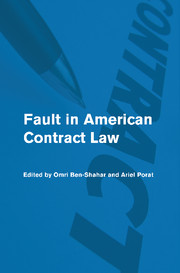Book contents
- Frontmatter
- Contents
- List of Contributors
- Preface
- Acknowledgment
- I THE CASE FOR STRICT LIABILITY
- II THE CASE FOR FAULT
- III BETWEEN STRICT LIABILITY AND FAULT
- IV WILLFUL BREACH
- V COMPARATIVE FAULT
- VI THE MORALITY OF BREACH
- 17 Why Breach of Contract May Not Be Immoral Given the Incompleteness of Contracts
- 18 Fault and Harm in Breach of Contract
- 19 Fault in Contracts: A Psychological Approach
- Case Index
- Subject Index
- References
18 - Fault and Harm in Breach of Contract
Published online by Cambridge University Press: 10 November 2010
- Frontmatter
- Contents
- List of Contributors
- Preface
- Acknowledgment
- I THE CASE FOR STRICT LIABILITY
- II THE CASE FOR FAULT
- III BETWEEN STRICT LIABILITY AND FAULT
- IV WILLFUL BREACH
- V COMPARATIVE FAULT
- VI THE MORALITY OF BREACH
- 17 Why Breach of Contract May Not Be Immoral Given the Incompleteness of Contracts
- 18 Fault and Harm in Breach of Contract
- 19 Fault in Contracts: A Psychological Approach
- Case Index
- Subject Index
- References
Summary
This chapter offers a defense of the common law's approach to considerations relating to moral culpability in breach of contract – an approach by which such considerations tend to play a fairly limited role in devising the appropriate response to a breach. Calls for assigning fault a more central role in the law of contract are often inspired by the thought that it ought to reflect more systematically and more directly the morality of promise. The chapter seeks to expose this theoretical stance as misguided, instead locating the common law's approach to fault in broader ideas underpinning the legal and the political culture of which the common law is a product, and in particular the harm principle. The chapter concludes with an outline of what makes a law of contract moral, taking issue with the view that a moral law of contract is one that sets out to enforce morality.
Introduction
The key to the interest in the philosophical foundations of contract – inconstant as it has been in recent decades – lies, I believe, in the relationship between contract and promise. That contract is the legal equivalent of an institution with a full and independent existence outside the law, though perhaps not a source of direct interest in its doctrinal dimensions, means that this branch of the law furnishes its students with a unique opportunity to investigate a certain dimension of the relationship between law and morality.
- Type
- Chapter
- Information
- Fault in American Contract Law , pp. 271 - 288Publisher: Cambridge University PressPrint publication year: 2010



